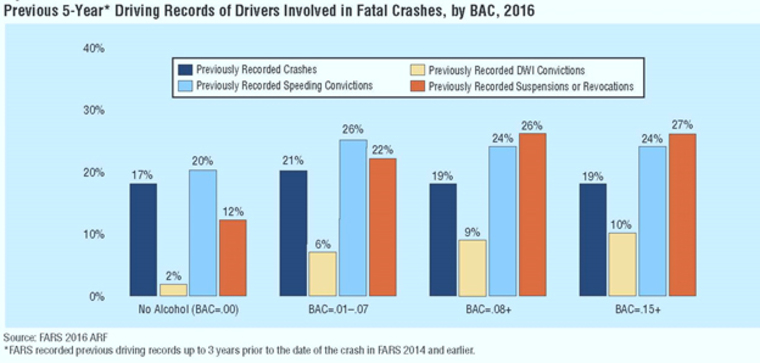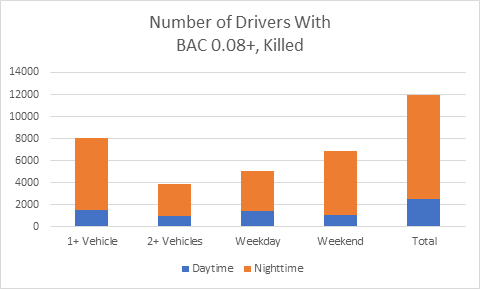Exploring the Causes of Fatal DUI Accidents
Unfortunately, we see a steady stream of families working to recover from drunk-driving accidents. In the “good” scenarios, someone has been seriously injured but survived; the “bad” ones involve the death of one or more members of the family. (As you can imagine, even the “good” cases are tragic – it’s all relative.)
A consistent question people consistently ask is, Why? Why us? Why did this have to happen? In the age of ride-sharing services just a swipe away, it can be hard to understand why anyone gets behind the wheel unless they are fully capable to drive safely.
While we cannot answer the Why question precisely, we can offer some insights about How that bring us closer to understanding Why. For example, driving skill seems to be an almost irrelevant determinant of fatal DUI crashes. As the graph below shows, about 20 percent of drivers killed in alcohol-involved crashes have a previous reported crash in the last five years.

The fact that 21 percent of drivers whose blood-alcohol content (BAC) was 0.01 to 0.07 had previously crashed, as compared to 19 percent for drivers with a BAC over the legal limit, might suggest that skill is a factor. If drivers who were not “legally drunk” still crashed, maybe that tells us something about their driving skill. But that theory, weak as it is, is basically disproven by the fact that drivers with zero alcohol in their system had the lowest rate of previous crashes.
The trend is the same for previous speeding convictions – drivers with a lawful limit of alcohol in their system had been caught speeding more often than the drunk drivers, but the sober drivers had a lower level still.
By contrast, the incidence of previous DWI convictions or prior suspension/revocation of one’s driver’s license is a clearer determinant. As the level of alcohol in a killed driver’s blood increases, so does the likelihood that the driver was previously convicted of driving drunk or had previously had a license suspended or revoked.
This suggests that fatal drunk driving accidents may be caused by habitual drunk drivers – people who just can’t internalize the idea that alcohol impairs driving ability and renders even “good drivers” unsafe on the road. It is a depressing conclusion to reach – it suggests that these deadly incidents might be caused be people who will never learn better.
Disconcerting as this theory it is, another set of data seems to support it. As the next chart shows quite convincingly, the overwhelming portion of drivers killed with a BAC of 0.08 or higher die in nighttime crashes. This is true in multi-vehicle crashes, but it is especially true in single-vehicle accidents. More of these drivers are killed on weekends than weekdays, but the difference (the growth, if you will) comes primarily from nighttime crashes.

This is consistent with the kind of behavior we all know is dangerous: drinking to excess and then getting behind the wheel. “I want to sleep in my own bed”; “I just want to get home”; we know the usual justifications. These data suggest that day drinkers – the image we have of someone who starts the day with a six-pack and ends it with a fifth of hard alcohol – are relatively small contributors to the scourge of DUI accidents. The threat is mainly from “normal folks” like most of us who jiggle the car keys in our hands like a pair of dice and put them to use in the same fate-tempting manner. However, if you are arrested for a DUI, no matter what the circumstances, you should always seek the help of a DUI lawyer.

